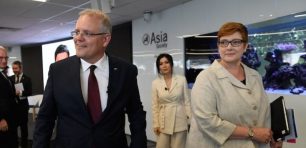
Former Minister for Industry, Science and Technology, Christian Porter. Source: AAP/Richard Wainwright
Australian startup leaders are not impressed at the outcome of Scott Morrison’s cabinet reshuffle yesterday, which saw Christian Porter move to head up the Industry, Science and Technology portfolio.
The consensus in the tech community seems to be that Morrison has effectively given Porter a back-seat role where he’s out of the spotlight, amid an ongoing lawsuit against the ABC.
For many, it’s yet another reminder that tech and startups are simply not a priority for the federal government.
Atlassian co-founder and co-chief Scott Farquhar noted in a tweet that the government has now “churned through” seven ministers in the technology and innovation portfolios in the space of eight years.
“Though technology is the largest and fastest-growing industry on the planet”, he added.
Though technology is the largest and fastest growing industry on the planet, the federal government has churned through 7 ministers in 8 years in the technology and innovation portfolio. This article nails it: https://t.co/xgdPbdSqcY
— Scott Farquhar (@scottfarkas) March 29, 2021
Speaking to SmartCompany, angel investor and founder of M8 Ventures Alan Jones suggests Porter has been given a portfolio where he is expected to “do absolutely nothing”.
“I don’t think we really needed any further evidence that the Coalition doesn’t care about investing in building our nation’s capacity to deliver innovation,” he notes.
“I wish this decision surprised me.”
One can only imagine the thinking behind the cabinet reshuffle, Jones muses.
“What portfolio do we have that is the least likely to need any new policy, or changes to existing policy?
“What industry are we planning on supporting the least through grants, education, training, export programs and investment?
“It doesn’t matter whether he has any relevant professional qualifications or industry experience.”
Ultimately, the industry, science and technology portfolio is “so low profile, [the government had] forgotten it existed”, Jones quips.
What does it mean for women in STEM?
There is another vein of criticism running through the sector, too.
Porter’s removal from the attorney general job was attributed to the potential his defamation lawsuit against the ABC could lead to a conflict of interest. That lawsuit centres around an historic rape allegation — which Porter vehemently denies — dating back to 1988.
Porter is currently taking time for mental health leave following the media storm around the allegation.
Advocates for women in tech are concerned that the controversies surrounding Porter will deter increased female participation in the field.
Jones suggests the appointment shows the Morrison government was “never really serious” about promoting women in STEM in the first place.
Meggie Palmer, founder of women’s career empowerment app peptalkher.com, called the appointment “a shortsighted and deeply disappointing decision”.
“An algorithm would have selected a better new minister,” she tells SmartCompany.
Placing Porter at the head of this particular portfolio “tells you everything you need to know about the backwards nature of this government’s attitude to not just women, but innovation as well”, she adds.
Palmer suggests it has never been more important to diversify the pipeline into this sector.
“This is not just a missed opportunity but a critical error.”
Elsewhere, Girl Geek Academy co-founder Sarah Moran, who took to the streets at the Canberra March for Justice earlier this month, suggests the ministerial change could cause women in tech to disengage with the department, and any women in STEM measures that come out of it.
And, as one final point of contention, while the government has not been one to place importance on science and tech, outgoing minister Karen Andrews (who is now Minister for Home Affairs) is also a former engineer, with considerable experience in the sector.
I have just learned that Christian Porter will become Minister for Industry, Science and Innovation.
This means he would be replacing Karen Andrews who has an engineering background and a long history in this role which she loves.
How does this reflect valuing women and merit??
— Lee Constable 🔥 (@Constababble) March 29, 2021
“Minister Karen Andrews was highly qualified to lead the Industry, Science and Technology portfolio,” Cicada Innovations chief Sally-Ann Williams tells SmartCompany.
“On top of her work to catalyse Australia’s innovation ecosystem and boost the growth of critical capabilities in research and onshore manufacturing, [she] was also a fervent advocate for women in STEM,” she adds.
Anyone following in Andrews’ footsteps, Williams suggests, will face the considerable challenge “to authentically lead an innovation and STEM agenda and champion women to take up these roles”.
Handpicked for you

Morrison’s new “women’s network”: What is it, who is involved, and will it help anything?



COMMENTS
SmartCompany is committed to hosting lively discussions. Help us keep the conversation useful, interesting and welcoming. We aim to publish comments quickly in the interest of promoting robust conversation, but we’re a small team and we deploy filters to protect against legal risk. Occasionally your comment may be held up while it is being reviewed, but we’re working as fast as we can to keep the conversation rolling.
The SmartCompany comment section is members-only content. Please subscribe to leave a comment.
The SmartCompany comment section is members-only content. Please login to leave a comment.